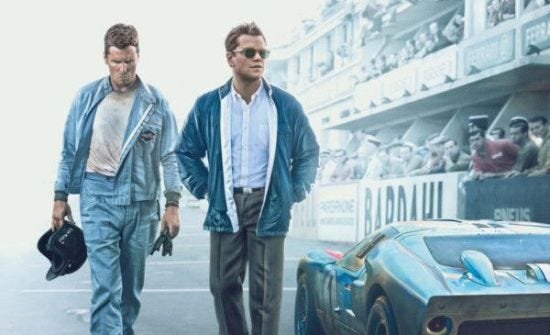Ford v Ferrari

If you’re a serious car person you know the story of Carroll Shelby and Le Mans. If you’re not, you’ve probably never heard of it.
Within the fairly niche-y segment of non-NASCAR auto racing, it’s considered one of the greatest legends in sports history. For car enthusiasts, Shelby’s name is spoken with hushed reverence. Most others ask who she is.
Short version: Shelby, a retired racer and struggling sports car designer, was tabbed by Ford Motor Company to take on Ferrari in the iconic 24 Hours of Le Mans race in the mid-1960s. The Italians were the storied Goliaths, having won seven of the last eight races, while Ford and the Americans were upstart Davids elbowing into a European racing culture that looked down their nose at them.
(No hints who came out on top.)
“Ford v Ferrari” is the absolutely terrific film chronicling that monumental endeavor. Aside from just being one of the best movies of the year, it triumphs on two distinct levels.
For initiates it’s a chance to bask in an engrossing story about figures who are new to them – sort of like “Rudy” or “Hoosiers.” For us gearheads, it’s a chance to discover a new aspect of the tale: the strange and strong bond between Shelby and his lead driver, Englishman Ken Miles.
Matt Damon and Christian Bale play Shelby and Miles, respectively, and it’s this pairing that really makes the movie find its highest gear. Like "Rush," the criminally overlooked racing drama from a few years ago, it's more about the contentious bond between these two men than the races themselves.
Damon’s Shelby is a plain-spoken, cowboy hat-wearing achiever who runs his own shop after heart troubles forces his retirement from racing after winning the 1959 Le Mans. He’s recruited by Ford to take on Enzo Ferrari (Remo Girone) and his racing team after Ford's offer to buy out the Italian company is rudely rejected.
As Miles, Bale has a sort of hunched-over, puckish charm. He’s got top-tier skills as a driver, but his independent attitude have led him to the bottom of the racing pile. No team will sponsor him, he barely ekes out a living running a one-man mechanic shop, though he still scores some wins in heaps he puts together from spare parts.
Shelby recognizes a kinship between them, though Miles is slower to commit. They are not so much attracted to speed as compelled by the need for it. Shelby is willing to negotiate the compromises and politics of working for a huge company, but Miles is the stubborn purist.
The only thing Miles craves is to drive the perfect lap with no mistakes – and then, another.
Ford Motor Company… does not come off looking great here. They’re depicted as a huge, uncaring monolith run by Henry Ford II (Tracy Letts), a magisterial egotist who’s willing to dump $9 million into developing a groundbreaking car, the GT40, just to show up Ferrari.
Jon Bernthal plays Lee Iacocca, the enterprising marketing guy at Ford who suggests tackling Le Mans and puts the pieces into motion. Josh Lucas is the heavy as Leo Beebe, the weasely #2 man at Ford who loathes Miles and continually works to undermine him – even if it means detonating their chances at the race.
Other members of the great supporting cast include Caitriona Balfe as Miles’ wife, Mollie, who stares at things straight on with wide open eyes and demands the truth; Noah Jupe as their son, Peter, who bears witness to the storytelling; and Ray McKinnon as the sage old mechanic who rejects computer testing of cars in favor of yarn and masking tape.
Indianapolis native Jason Keller wrote the original screenplay, which batted around Hollywood for a while and once had Tom Cruise and Brad Pitt attached. Brother screenwriters Jez and John-Henry Butterworth added a polish.
Director James Mangold (“Wolverine”) and his technical crew do a fabulous job with the racing scenes, from the staggering crashes to the screeching soundscape. Unlike American style races where drivers turn left for a few hours, Le Mans is an eight-mile endurance test on real roads that spans from day to night and back again, with drivers swapping out every few hours.
I adored the way Miles keeps up an ongoing dialogue between himself and the car, a sort of pace-setting patter prior to the days of radio communication between racer and pit crew. With his British lilt and colorful language, we get lovingly off-kilter dialogue, like the car “still feels like a bag of squirrels.”
I’ve complained a lot about overlong films of late, but “Ford v Ferrari” earns every second of its 152 minutes. This is one of those rare movies with an epic scale but a very intimate feel. In a just world, it would chase Oscar trophies.



